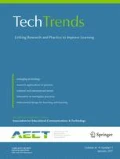Abstract
The Educational Technology Certificate (ETC.) courses at Michigan State University are a set of three courses that can be taken as a standalone qualification or as the first three courses in the Master’s of Educational Technology degree. Together, the courses emphasize the development of technology skills and advanced mindsets for technology integration in the classroom. In this article, we provide examples of our approach to the teaching of technology skills and mindsets in ways that are adaptable across four distinct modes of instruction (online, hybrid, overseas and faceto-face). We also present student feedback and survey data that inform a critical evaluation of the program’s effectiveness. Findings suggest that the certificate courses help students to gain technological skills, to become more confident users of technology and more likely to help colleagues with tech-related questions. Interestingly, respondents also reported feeling like better teachers, in general, after taking these courses.
References
Betrus, B. A. (2012). Historical evolution of instructional technology in teacher education programs : A ten-year update. TechTrends, 56(5), 42–46.
Bransford, J. D., Brown, A. L., & Cocking, R. R. (2000). How people learn: Brain, mind, experience and school. Washington, DC: National Academy Press.
Glogster EDU (2012). [Web-based tool] Retrieved June 20, 2012, from http://edu.glogster.com/
Goel, N. & Piyush, P. (2012). Wallwisher [Web-based tool] Retrieved July 1, 2013, from http://wallwisher.com
Hartsell, T., Herron, S.S., Fang, & Rathod, A. (2010). Improving teachers’ self-confidence in learning technology skills and math education through professional development. International Journal of Information and Communication Technology Education, 6(2), 47–61. doi: 10.4018/jicte.2010040105
Henry, L. A. (2006). SEARCHing for an answer: The critical role of new literacies while reading on the Internet. The Reading Teacher, 59(7), 614–627.
Infoteria Corporation (2012). Lino [Webbased tool] Retrieved June 20, 2012 from http://en.linoit.com/
Kintsch, W. (2006). Learning and constructivism. In S. Tobias & T.M. Duffy (Eds.) Constructivist instruction: Success or failure? (pp. 223–241). New York: Routledge.
Koehler, M.J., & Mishra, P. (2008). Introducing TPCK. In AACTE Committee on Innovation and Technology (Eds.) Handbook of technological pedagogical content knowedge (TPCK) for educators (pp. 3–30). New York: Routledge Taylor & Francis Group.
Leu, D. J., Kinzer, C. K., Coiro, J., & Cammack, D. W. (2004). Toward a theory of new literacies emerging from the Internet and other information communication technologies. In R. Ruddell & N. Unrau (Eds.), Theoretical models and processes of reading (5th ed., pp. 1568–1611). Newark, DE: International Reading Association.
Leu, D.J., McVerry, J.G., O’Byrne, W.I., Zawilinski, L., Castek, J. & Hartman, D.K. (2009). The new literacies of online reading comprehension and the irony of no child left behind: Students who require our assistance the most, actually receive it the least. In L.M. Morrow, R. Rueda & D. Lapp (Eds.) The handbook of research on literacy and diversity (pp. 173–194). New York: Guilford Press.
Mishra, P., & Koehler, M. J. (2006). Technological Pedagogical Content Knowledge: A Framework for Teacher Knowledge. Teachers College Record, 108(6), 1017–1054. doi:10.1111/j.1467-9620.2006.00684.x
National Center for Education Statistics (2011). Digest of education statistics: Table 109. Washington, DC: US Department of Education. Retrieved January 4, 2013, from http://nces.ed.gov/programs/digest/d11/
National Governors Association Center for Best Practices (NGAC) & The Council of Chief State School Officers (CCSSO) (2010). Common core state standards for English language arts & history/social studies, science & technical subjects. Washington, DC. Retrieved March 1, 2012, from http://www.corestandards.org/the-standards
Shriner, M., Clark, D.A., Nail, M, Schlee, B.M. & Libler, R. (2010). Social studies instruction: Changing teacher confidence in classrooms enhanced by technology. The Social Studies, 101, 37–45. doi: 10.1080/00377990903283999
US Department of Education, Office of Educational Technology (2010). Transforming American education: Learning powered by technology. Washington DC: US Department of Education. Retrieved June 15, 2012, from http://www.ed.gov/technology/netp-2010
Wolf, L.G., (2009). Quickfires explained. Retrieved January 4, 2013 from http://www.leighgraveswolf.com/2009/08/19/quickfires-explained
Zhao, Y. (2007). Social studies teachers’ perspectives of technology integration. Journal of Technology and Teacher Education, 15, 311–333.
Author information
Authors and Affiliations
Rights and permissions
About this article
Cite this article
Hagerman, M.S., Keller, A. & Spicer, J.L. The MSU Educational Technology Certificate Courses and Their Impact on Teachers’ Growth as Technology Integrators. TECHTRENDS TECH TRENDS 57, 26–33 (2013). https://doi.org/10.1007/s11528-013-0659-8
Published:
Issue Date:
DOI: https://doi.org/10.1007/s11528-013-0659-8

